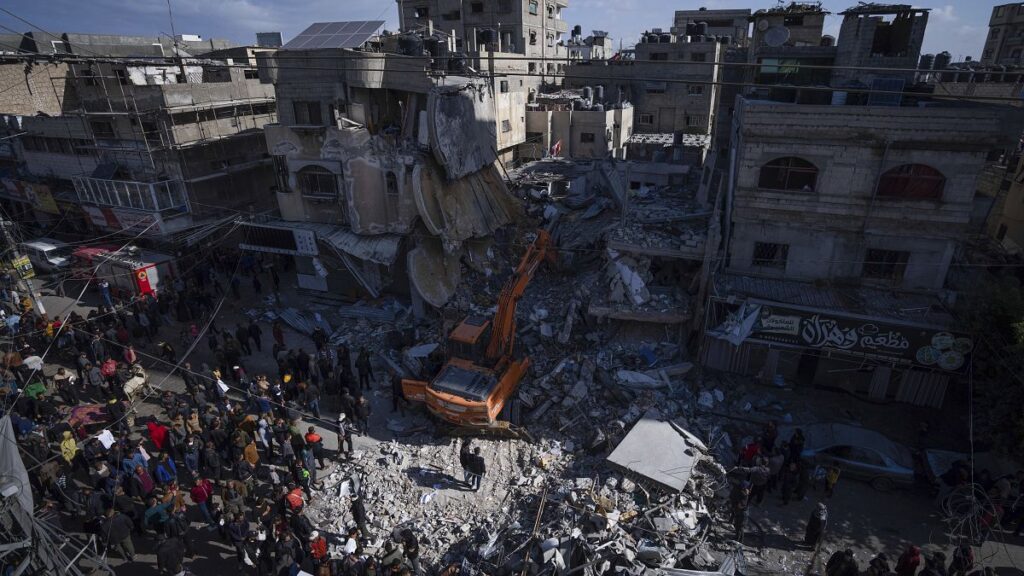Three days of negotiations with Hamas over a ceasefire in Gaza and the release of Israeli hostages failed Tuesday, Egyptian officials said, less than a week before the start of the Muslim holy month of Ramadan. informal deadline for reaching an agreement.
Two Egyptian officials said that the latest round of talks ended on Tuesday. They said Hamas had presented a proposal that mediators would discuss with Israel in the coming days. One of the officials said the mediators are scheduled to meet Wednesday with the Hamas delegation, which has not left Cairo.
The United States, Qatar and Egypt have spent weeks trying to negotiate a deal in which Hamas would release up to 40 hostages in exchange for a six-week ceasefire, the release of some Palestinian prisoners and a significant influx of aid into the isolated territory.
Negotiations blocked
Hamas has refused to release all of the hundred hostages it is holding, as well as the remains of around 30 others, unless Israel ends its offensive, withdraws from Gaza and releases large number of Palestinian prisonersincluding high-ranking activists sentenced to life imprisonment.
U.S. officials have said they doubt Hamas actually wants to make a deal because the group has opposed a number of demands that the United States and other countries consider legitimate, including giving the names of the hostages to be released.
“It is up to Hamas to decide whether it is ready to engage” US Secretary of State Antony Blinken said on Tuesday.
“We have an opportunity to establish an immediate ceasefire that would bring hostages home, significantly increase humanitarian aid to Palestinians who desperately need it, and create the conditions for a lasting resolution“said Antony Blinken.
A senior Hamas official, Osama Hamdan, said Tuesday that his group was demanding a permanent ceasefire, rather than a six-week pause, and a “complete withdrawal” Israeli forces.
“The security of our people will only be ensured by a permanent ceasefire, an end to the aggression and the withdrawal of every part of the Gaza Strip“, Osama Hamdan told the press in Beirut.
Israeli disagreements
Israeli Prime Minister Benjamin Netanyahu publicly rejected Hamas’ demands and has repeatedly pledged to continue the war until Hamas is dismantled and all hostages returned. Israel did not send a delegation to the last round of negotiations.
Israel is still waiting for Hamas to give it a list of living hostages as well as the ratio of hostages to prisoners it demands in any release deal, an Israeli official said. It was unclear whether this information was included in the latest proposal.
The Israeli and Egyptian officials spoke on condition of anonymity because they were not authorized to brief the media on the negotiations.
When asked whether Hamas had a list of surviving hostages, Osama Hamdan said the question had nothing to do with the talks and accused Israel of using it as an excuse to avoid engage in negotiations.
Benny Gantz, a member of Benjamin Netanyahu’s war cabinet and his main political rival, met with senior US officials in Washington during a visit by the prime minister, the latest sign of growing dissension within the leadership of Israel.
The mediators had hoped to reach an agreement before Ramadan, a month of fasting from dawn to dusk, during which Israeli-Palestinian tensions are often heightened over access to an important holy site in Jerusalem. Ramadan is expected to begin around March 10, depending on the appearance of the moon.
“Negotiations are delicate. I can’t say there is optimism or pessimism, but we have not yet reached a point where we could achieve a ceasefire” Egyptian Foreign Minister Sameh Shoukry said on Monday.
Humanitarian disaster
The war began with a Hamas attack on southern Israel on October 7, in which Palestinian militants killed around 1,200 people and took some 250 hostages. More than 100 of them were freed during a week-long ceasefire in November.
The attack triggered an Israeli invasion of the enclave of 2.3 million people that, according to Gaza’s health ministry, killed more than 30,000 Palestinians. Aid organizations say the fighting has displaced most of the territory’s population and pushed a quarter of the population to the brink of famine.
The nearly five-month-old fighting has left much of the Gaza Strip in ruins and caused a deepening humanitarian catastrophe, with many people, particularly in the devastated northern region, desperate for shelter. food to survive.
Humanitarian organizations said it had become virtually impossible to deliver aid to much of the Gaza Strip due to difficulty in coordinating with the Israeli military, ongoing hostilities and the collapse of public order.

